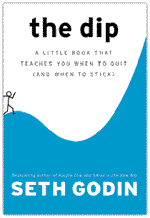17 May 2012 11:54 am
Posted by Dave under Book Review
Brave, Smart or Stupid
The Dip: A Little Book That Teaches You When to Quit (and When to Stick) by Seth Godin, 2007, Portfolio (ISBN: 978-1591841661)
A month or so ago when I posted about Seth Godin’s Stop Stealing Dreams manifesto, I mentioned this little book, The Dip. I pulled it off the shelf and tucked it into my carry-on when we went to Ottawa and re-read it on the flight out. It is a little book, about 7 x 5 inches and less than a hundred pages – easily read in just an hour or two. It takes longer to think through how you might apply the concepts that to read about them. The concept presented in The Dip is simple: count the cost before you start on an ambitious task and if you are not willing or able to persevere to the end – quit now.
Godin postulates that all worthwhile endeavours have a dip – a low point after an initial amount of reward or success where the going gets tough. The initial rush of feeling good about a new project hits the doldrums of working through the never-ending details and you ask yourself, “Is this worth it?” And, if you decide that it isn’t worth it, you quit. It was the right question, but asked at the wrong time and with the worst possible outcome, quitting after a significant investment (in time, effort, money, reputation…) is totally lost. Godin illustrates this point with the story of Butch Cassidy and the Sundance Kid – quitting because the posse is making your life difficult as you head deeper into the hills is a stupid choice, it only gets you killed. The time to choose is before you rob the train – at that time there are two good choices: don’t start if you can’t finish, or summon the strength to see it through to the end. The first is smart, the latter, brave.
Ok, so you aren’t likely thinking about robbing a train – but what about learning a new skill, changing careers or getting behind a cause you believe in? If the task is worthwhile, it most certainly will have a dip. In fact, the bigger the potential reward the longer and deeper the dip is likely to be. Counting the cost before starting is the sign of maturity and the choice to be brave (and see the job through to the end) or to be smart (and find something else to attempt where you can be brave) is crucial to avoid being stupid and quitting in the dip.
I was struck by how this idea ties in with some of the concepts from other books I’ve read – Dan Pink might say that purpose allows bravery, and building mastery underpins perseverance in the dip. Ken Robinson would probably argue that the passion, interest and opportunity required to be in your element help you to understand what is worth seeing through to the end. Don Miller could argue that inciting incidents lead you into the dip and character gets you to the other side. No matter what, facing the dip is unavoidable – thus having the foresight to understand the difference between brave, smart and stupid then choosing wisely at the beginning is essential for success.
Leave a Reply
You must be logged in to post a comment.
